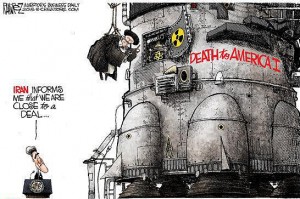Special to WorldTribune.com
By James Robbins, U.S. News
If North Korea could develop and test a nuclear weapon, even under a stringent arms control regime, why can’t Iran also build a bomb under a far less ample nuclear deal?
 It seems like we have been here before. In the early 1990s, concerns were growing that North Korea was on the verge of developing nuclear weapons capability. In 1994, the United States and North Korea adopted an agreement called the “Agreed Framework,” which called on Pyongyang to freeze and dismantle its nuclear program, place its spent uranium fuel under international control and allow the International Atomic Energy Agency to verify compliance through “special inspections.” In return, North Korea would receive two light water reactors that had no weapons applications, shipments of fuel oil and a promised move toward normalization of political and economic relations.
It seems like we have been here before. In the early 1990s, concerns were growing that North Korea was on the verge of developing nuclear weapons capability. In 1994, the United States and North Korea adopted an agreement called the “Agreed Framework,” which called on Pyongyang to freeze and dismantle its nuclear program, place its spent uranium fuel under international control and allow the International Atomic Energy Agency to verify compliance through “special inspections.” In return, North Korea would receive two light water reactors that had no weapons applications, shipments of fuel oil and a promised move toward normalization of political and economic relations.
The Agreed Framework seemed to get off to a good start, but ultimately failed. The International Atomic Energy Agency maintained a presence at the Yongbyon nuclear site to verify compliance, but North Korea and the agency became locked in contentious talks over technical aspects of compliance that made it difficult if not impossible to know if the freeze was actually being implemented. The agency had good reason to be suspicious. Pyongyang had started a secret centrifuge program and was suspected of producing weapons-grade plutonium. As well, North Korea aggressively pursued a ballistic missile program despite the fact that it was disrupting other efforts to normalize relations.
In 2002, North Korea admitted to Assistant Secretary of State for East Asian Affairs James A. Kelly that it had a program to enrich uranium for nuclear weapons. This was in direct violation of the Agreed Framework, the Non-Proliferation Treaty (which North Korea shortly withdrew from) and other international agreements. The International Atomic Energy Agency, which had been frustrated in its task to verify the freeze, referred the matter to the U.N. Security Council. The Six Party talks followed, which seemed to show some progress in coaxing North Korea back from its dangerous path. But in October 2006, Pyongyang announced it had tested a nuclear weapon. Diplomacy failed.
SEE COMPLETE TEXT

You must be logged in to post a comment Login